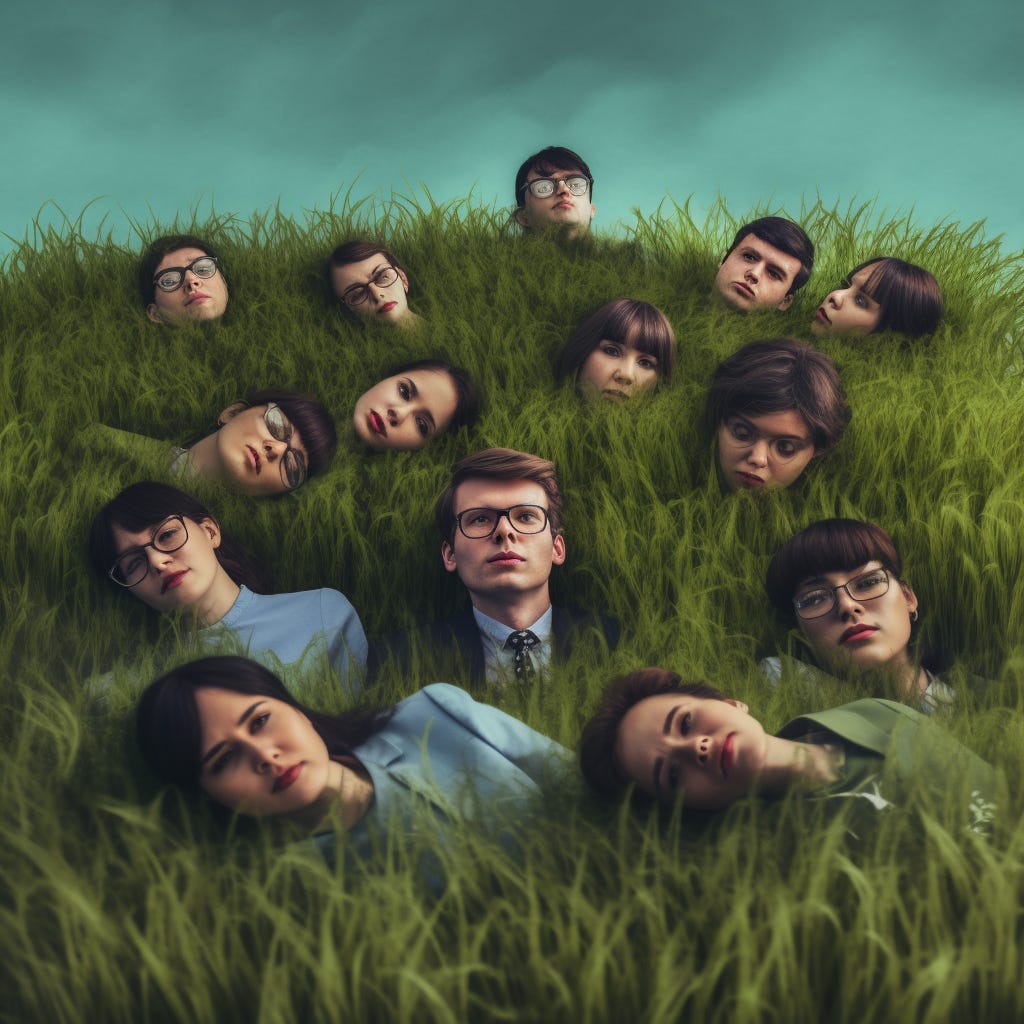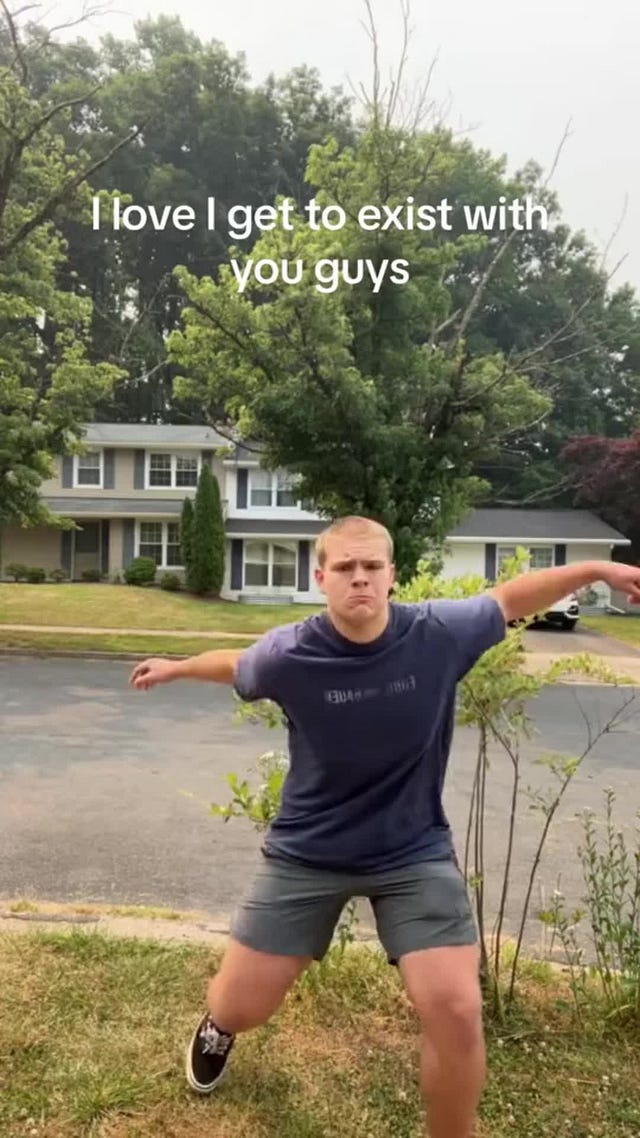Reddit's Blackout and Giving Up Web 2.0 for Touch-Grass Tuesdays
Also: The Nakagin Capsule Tower, the Pinegrove Shuffle, and new Smart Contract Art
Seeing the Reddit blackout left me both excited and sad. Sad, because, in a way, it’s grieving the loss of a certain era of the web. And, my suspicion is, is that this will continue to happen.
I grew up coding on the web back in 2008 by building mashups. APIs were just launching, OAuth was brand new, and the wonderful possibility of open datasets being linked and expanded upon was a dream. I made success by creating a project called Tweekly.fm, which changed hands twice over its lifetime to eventually die in April this year due to Twitter’s API changes. It was a simple idea: parse your weekly listens from Last.fm and publish it to Twitter (and other social media sites). Millions of updates were sent and people enjoyed discovering new music together!
Then, a pivotal moment happened when Twitter had a choice on their table: become plumbing of the web OR close up and sell ads. The latter happened and people got burned by the API in 2012.
Among the changes: requiring all developers that use Twitter’s API to authenticate their identities, limiting the rate at which they can pull information from Twitter’s servers, cracking down on clients that don’t treat retweets and replies the same way Twitter itself does, and capping the number of users that any third-party Twitter-based app can have. In short, it will be impossible to build or run an app that relies on Twitter in any significant way without approval from Twitter itself.
Luckily, I discovered blockchain technology during this period, glad that at least in some sense, a p2p technology could remain future proof: its APIs won’t rapidly change underneath you, and the incentives would remain to keep it public and accessible.
And now… 2023 ushered in a new paradigm where these companies (prime examples being Twitter and Reddit) are upscaling the cost of their APIs to prices that are untenable. They are closing more and more walls. And that’s sad. But, in a way, it’s a reckoning of a different sort: few of these platforms were truly sustainable. Some could only survive and continue to remain unprofitable off the backs off the free contributions from its users because there was a lot of zero-interest rate cash floating around.
There’s also another reckoning in that, this shift comes from the rise of AI tools that can be only be good at what they do, if they consume this free labor from the community that was given in support of each other: to an LLM or to a platform for that matter. I understand why Reddit would want this. They aren’t profitable and they have a treasure trove of the most valuable data on the internet. I mean, who here, today, doesn’t Google by also a “reddit” at the end of it?
I don’t know where this ends, but there’s a sense a feeling of a sense of inevitably to all this: that maybe the walls will keep closing in. More walls will go up. Some of the most used platforms are still unprofitable. They need to make money. Platform data will be treated like an AI Dark Forest. Can’t have it out in public or will it be slurped up by an LLM.
BUT… there’s a flip side to this. I LOVE that I’m seeing users also fight the fight for what they deserve. Reddit is built on the backbone of moderators and users that do very unforgiving work. Taking back that power shows that we do have *some* collective power as users of the web’s platforms.
There’s also another side of this that I think is a hint to where this might all lead to. The pendulum of the platform web, buffeted by the strong wind of a very-online pandemic, that perhaps we’ll go outside and touch more grass. The open web itself has become more hostile. We’ll continue to move to a cozier web. A pub with a fire in the corner web. And using those tools to get outside to the people we care about.
In continuing support for the blackouts, some subreddits are proposing “touch-grass Tuesdays”: only shutting down on Tuesdays. Maybe, that’s what we all need to get out from the yoke of the platforms that have gobbled us all up into its datasets and algorithms.
Every Tuesday, turn off the web, get outside and touch some grass. Just watch out for the ticks.
SFMOMA Acquires A Nakagin Capsule
One of the most iconic buildings in Tokyo was demolished in 2022. A reminder of an era where cities experimented more readily with different architecture (instead of the same homogenous CBD’s of readymade box glass facades). The metabolism movement is still an interesting idea for how we should think about cities.
Here’s a great video that also takes inside the Nakagin Capsule tower:
In an ironic twist, it’s cellular and modular nature meant that some of the capsules could be saved (thanks to Tatsuyuki Maeda). SFMoMA acquired one. I think it’s great this has been saved.
Any buildings from late 20th century that you like that we won’t really build again?
The People Around You
Sachin has an interesting post out talking about the people we come to see as regulars in our lives.
What struck me the most was this line:
I like going to my local coffee shop and witnessing the same routine every day. I see the barista there more than my friends. This has become uncomfortable because I've to make up increasingly elaborate stories when she asks, "how's it going?". Even my mom has not cared about my well-being so much.
As someone who’s emigrated away from what I once knew: away from old friends and family, it hit harder than I expected. I know this routine too. Twice a week, I walk to a local Starbucks and I’ve come to notice all the regulars: from the baristas (one of them has a cool hat with badges on it), the elderly couples outside with their dogs, and an elderly gentleman furiously scribbling/writing in a notebook in the corner.
I see these people more than some of my closest friends. It’s a reminder of needing to connect more regularly with the people I care about, even when they are no longer physically close. It’s also a reminder of not shying away from connecting with regular faces in your community.
AI & Redistribution
I enjoyed this take from Noah Smith. Treating the symptoms of the unfolding AI boom is the wrong approach. I think a lot of hatred and dissatisfaction comes from the fact that much our current systems are rotten. It’s more likely for people to come at each other’s throats if one’s livelihood is at the cost of the other. In this case, the ““tech bro”” trampling without awareness, espousing “disruption” like it’s a good thing and destroying livelihoods of creators.
We should rather be focusing on improving existing systems of redistribution. Instead of detailed, mixed-bag regulation and enforcements, we’d more likely tolerate changes to the status quo if there was a belief that we’d be able to get back up when we fall.
But in fact I think we can probably do better than that. Instead of trying to slow down technologies that sound scary, or waiting to clean up problems after they happen, we can improve the robustness of our institutions now. With more robust institutions, we can minimize any negative technological impacts on human workers, and reduce the amount of “cleaning up” we need to do later.
Noah says this comes down to increasing labor power + the welfare state.
On labor power:
Some technologists will simply assume that unions will be eternal enemies of automation, and that technology can only progress over labor power’s dead body. But I think the experience of Northern European countries shows that when unions are given a long-term stake in the growth and competitiveness of their companies, their interests become much more aligned in favor of embracing new technology.
On the welfare state:
A welfare state can’t prevent every negative outcome for every individual, of course, but it can strongly mitigate any overall disruptive impact of technologies, through taxes and government benefits.
I always wonder if there aren’t better mechanisms that get you 80% there with less hassle. I’m not a big fan of cash UBI, but rather more focused on aligning people together on collective growth. Universal Basic Equity has a nicer ring to it. A simple implementation is that each year, each citizen gets a portion of a bag of stocks or index fund which they can choose to hold or sell.
Another reframing I always had in mind was Universal Basic Optionality: ensuring options remain available to people who remain at the bottom of the wealth pyramid.
Anyway, this rabbit hole can be quite massive, so I’ll leave some musings on this for the future.
Smart Contract Art: 0xfff.eth’s Beef
I love this collection from 0xfff. Art is the most interesting when it leans into its medium. This collection inscribes various rules for each piece, that restricts them in unique and interesting ways.


It’s a nice and simple example as a collection of ways to think about smart contract based art in general. What can art be if we inscribe rules into itself? It’s more than just a token with a link to a bored monkey jpg.
Let Right-on-Red Die
One of the weirdest road rules that’s especially jarring for someone who recently moved the US. You can turn right-on-red. Now, more cities are starting to propose that it’s a dumb rule. Because it is.
Imagine driving in the USA and seeing this, and going: “how am I suppose to quickly know/understand what I can do?”
Because: usually, if you can’t right-turn-on-red, there’s a sign for on the opposite side. Tiny as hell. What’s going to be even more annoying (for those who live in the DMV). Right turn on red will be banned by 2025 in DC, but still legal in Maryland or Virginia. MESSSSSS.
The Pinegrove Shuffle
One of my favourite recent dance trends on TikTok. What I love about the Pinegrove Shuffle is that it’s not your usual crowd of what you expect from a TikTok dance trend. It’s all misfits, weirdos, the midwest emo stranded in Americana somewhere, energy. The more depressing, the better.
It’s so hopelessly hopeful. I love it.
Hooray For Earth - Fantasy Something
The song that’s been on repeat this week.
Such a lush track.
That’s it for this week, friends! Enjoy a sunset. :)
Simon
PS. If enjoy this newsletter, please share it, or consider upgrading to a paid (patronage) tier. :)






